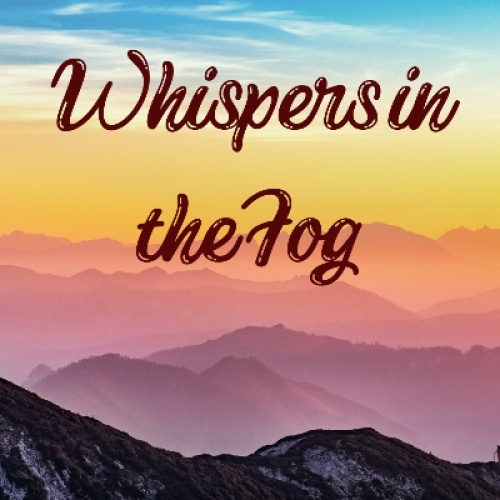The fog wrapped around the town like a shroud, thick and silent. I stepped off the bus, my breath hitching at the weight of anonymity. I was Clara Monroe now, a name as soft as the mist. Maggie's inn stood welcoming, lights twinkling against the gray, and I felt a flicker of warmth as I approached.
"Well, look who we have here! You must be new to our little slice of the world," Maggie chirped, her voice cheerful and enveloping.
I nodded, managing a small smile.
"Room's ready. You'll love the view of the cliffs. They're something else in the morning light."
I had no intention of staying long, but the cliffs called to me. Days blurred into one another. I wandered the rocky edges, inhaling the salty air, and found solace at the old theater, fingers dancing over the piano keys, releasing notes that floated into the void.
On one such foggy night, the music drifted across the water, reaching Elias in his lighthouse. He paused, wrenching his gaze from the lantern's glow.
"What is that?" he murmured, a feeling stirring deep within him, a long-buried ache.
Weeks passed, and Elias felt a magnetic pull toward the source of the sound. He left a note in a buoy one evening, words scrawled in a frenzy.
"Who plays so beautifully in the fog?" I found it the next morning, my pulse quickening. I wrote back, folding my response into a sheet of music, leaving it tucked beneath an old plank in the theater.
Days turned into a dance of notes back and forth, our anonymity a thrill. I could feel him - his presence, his longing - through the words.
Then Theo, Elias's teenage nephew, stumbled upon our secret. "You know, I'm getting some great shots of the fog. I might have even caught you at the piano," he teased, his camera slung around his neck.
I felt my heart race. "Theo, you can't show anyone!"
"Relax! It's just for me." He winked, that youthful mischief lighting up his eyes.
But shadows loomed. A journalist showed up one afternoon, digging through my past like a vulture.
"Clara Monroe, the pianist who cracked under pressure. You have a lot to answer for," he sneered.
I stumbled back, the weight of my past crashing down. I was running away, and now it was chasing me. Elias sensed the shift, his walls rising as he turned away. "You should go back. You don't belong here."
A storm rolled in, thunder rumbling, winds howling. The lighthouse flickered as Elias prepared for an emergency. When a ship's distress signal blared through the tumult, I felt the urge to help.
"I can signal," I shouted above the din, my heart racing.
He hesitated, then nodded. "Okay, let's do this together."
In that moment, clarity dawned. I wasn't just hiding; I could be part of something again. As we worked in tandem, communicating with flashes of light, I felt the fog lift, both outside and in.
After the storm, I stood at the cliffs, breathless. "I'm not running anymore, Elias. I want to stay."
He stepped closer, vulnerability etched on his face. "I lost someone once. I didn't think I could feel again."
"We can heal together," I whispered.
With the town rebuilding the theater, laughter and music returned, a new heartbeat pulsing through the fog.
One evening, as the mist draped itself around the lighthouse, I played again, the notes swirling into the air. Elias stood at the edge, listening, no longer alone.
"Clara," he called softly, and I knew then that silence had turned into connection, binding us in a way that felt like home.
"Well, look who we have here! You must be new to our little slice of the world," Maggie chirped, her voice cheerful and enveloping.
I nodded, managing a small smile.
"Room's ready. You'll love the view of the cliffs. They're something else in the morning light."
I had no intention of staying long, but the cliffs called to me. Days blurred into one another. I wandered the rocky edges, inhaling the salty air, and found solace at the old theater, fingers dancing over the piano keys, releasing notes that floated into the void.
On one such foggy night, the music drifted across the water, reaching Elias in his lighthouse. He paused, wrenching his gaze from the lantern's glow.
"What is that?" he murmured, a feeling stirring deep within him, a long-buried ache.
Weeks passed, and Elias felt a magnetic pull toward the source of the sound. He left a note in a buoy one evening, words scrawled in a frenzy.
"Who plays so beautifully in the fog?" I found it the next morning, my pulse quickening. I wrote back, folding my response into a sheet of music, leaving it tucked beneath an old plank in the theater.
Days turned into a dance of notes back and forth, our anonymity a thrill. I could feel him - his presence, his longing - through the words.
Then Theo, Elias's teenage nephew, stumbled upon our secret. "You know, I'm getting some great shots of the fog. I might have even caught you at the piano," he teased, his camera slung around his neck.
I felt my heart race. "Theo, you can't show anyone!"
"Relax! It's just for me." He winked, that youthful mischief lighting up his eyes.
But shadows loomed. A journalist showed up one afternoon, digging through my past like a vulture.
"Clara Monroe, the pianist who cracked under pressure. You have a lot to answer for," he sneered.
I stumbled back, the weight of my past crashing down. I was running away, and now it was chasing me. Elias sensed the shift, his walls rising as he turned away. "You should go back. You don't belong here."
A storm rolled in, thunder rumbling, winds howling. The lighthouse flickered as Elias prepared for an emergency. When a ship's distress signal blared through the tumult, I felt the urge to help.
"I can signal," I shouted above the din, my heart racing.
He hesitated, then nodded. "Okay, let's do this together."
In that moment, clarity dawned. I wasn't just hiding; I could be part of something again. As we worked in tandem, communicating with flashes of light, I felt the fog lift, both outside and in.
After the storm, I stood at the cliffs, breathless. "I'm not running anymore, Elias. I want to stay."
He stepped closer, vulnerability etched on his face. "I lost someone once. I didn't think I could feel again."
"We can heal together," I whispered.
With the town rebuilding the theater, laughter and music returned, a new heartbeat pulsing through the fog.
One evening, as the mist draped itself around the lighthouse, I played again, the notes swirling into the air. Elias stood at the edge, listening, no longer alone.
"Clara," he called softly, and I knew then that silence had turned into connection, binding us in a way that felt like home.








